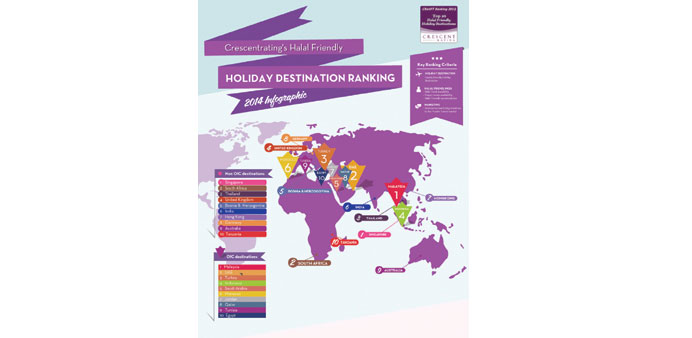By Arno Maierbrugger
Halal tourism, or Muslim-friendly travelling, is set to grow to a multibillion dollar business over the coming years based on rising attentiveness of tour operators towards the needs of Muslim tourists and the growing affluence of Muslims in population-rich Islamic countries especially in Southeast Asia and China.
The halal travel market was estimated to be worth $140bn in 2013, accounting for almost 13% of the global total, and is expected to rise to $200bn by 2020, according to Crescentrating, a Singapore-based rating agency for halal-friendly travel services.
While Muslim travel in the past has been mainly related to providing services to Haj and Umrah pilgrims, travel agencies are now catering to a far more diverse spectrum of Muslim travellers. In East and Southeast Asia alone, the regions with the highest number of Muslims worldwide, hundreds of Muslim-only tour groups have emerged, offering services such as booking of halal hotels and itineraries that include halal-certified restaurants and the provision of prayer rooms at airports and shopping malls and other Muslim facilities, as well as Muslim-friendly business travel to meetings or events.
These tour groups are increasingly reaching out to international customers, namely in the Middle East, but also in Europe and the US.
Interestingly, Shinto-dominated Japan has emerged as a popular destination for Muslim travellers, with hotels and airports having started to offer halal food and prayer rooms, according to Crescentrating CEO Fazal Bahardeen.
For Middle East investors the boom in halal tourism can be seen as a great opportunity. Growth rates in Asia are forecast to be as high as 30% annually, with the segment for meetings, incentives, conferences and events (MICE) expected to grow fastest, says Reto Kaufmann, head of MICE Sales Asia at Kuoni Group Travel Experts, part of Kuoni, one of the largest tourism companies worldwide.
And the sector is indeed moving quickly. Crescentrating says it will accredit more than 100 halal travel agencies over the next 12 months, with more to expect as long as they are rightfully accredited in their home country and/or by Iata (International Air Transport Association), send their staff to training workshops and offer Muslim-only travel packages.
Crescentrating is also ranking the most Muslim-friendly holiday destinations among member countries of the Organisation of Islamic Co-operation (OIC) and outside. Among OIC countries, Malaysia in 2014 continued to hold on to its top position as the most halal friendly holiday destination, followed by the UAE, Turkey, Indonesia, Saudi Arabia, Morocco, Jordan, Qatar, Tunisia and Egypt.
Among the top-five non-OIC countries, Singapore leads the pack ahead of South Africa, Thailand, UK and Bosnia-Herzegowina. Japan has made a jump from 50th to 40th place in the overall list, the best improvement among the 60 destinations tracked, and it also released a special travel guide for Muslim travellers last year. Thailand’s Suvarnabhumi International Airport was ranked the top Muslim-friendly airport in non-OIC countries.
At the other end of the ranking, Tajikistan, Uzbekistan and Nigeria (OIC), and Belgium, Ireland and Mexico (non-OIC) where the countries with the least developed facilities for Muslim travellers.

